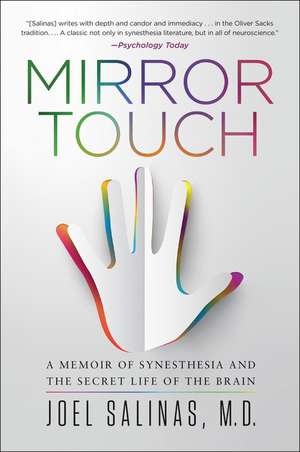Mirror Touch: A Memoir of Synesthesia and the Secret Life of the Brain
Autor Joel Salinas, M.D.en Limba Engleză Paperback – 2 apr 2018
Beautifully written and wholly original, Mirror Touch is a moving account of an exceptional mind that challenges our understanding of what it means to be human—everything it means to think, to feel, and to be.
Preț: 106.40 lei
Nou
Puncte Express: 160
Preț estimativ în valută:
20.36€ • 21.31$ • 16.85£
20.36€ • 21.31$ • 16.85£
Carte disponibilă
Livrare economică 15-29 martie
Preluare comenzi: 021 569.72.76
Specificații
ISBN-13: 9780062458612
ISBN-10: 0062458612
Pagini: 320
Dimensiuni: 135 x 203 x 18 mm
Greutate: 0.23 kg
Editura: HarperCollins Publishers
Colecția HarperOne
ISBN-10: 0062458612
Pagini: 320
Dimensiuni: 135 x 203 x 18 mm
Greutate: 0.23 kg
Editura: HarperCollins Publishers
Colecția HarperOne
Textul de pe ultima copertă
Challenging our understanding of what it means to be human, Joel Salinas, a Harvard-trained researcher and neurologist at Massachusetts General, shares his experiences with mirror-touch synesthesia, a rare and only recently identified neurological trait that causes him to feel the emotional and physical experiences of other people. Performing a spinal tap, he feels the needle slowly enter his lower back. If a disoriented patient flies into a confused rage, Salinas slips into a similarly agitated physical state, and when a patient dies, he experiences an involuntary ruin—his body starts to feel vacant and lifeless, like a limp balloon.
Susceptible to the pain and discomfort of his patients, most of whom suffer from a host of disorders and extreme injuries, Salinas uses his trait to treat their symptoms, almost as if they were his own. At the same time, in his personal life, his mirror touch blurs the boundaries between himself and those close to him until he ends up inextricably entangled, no longer able to differentiate where he ends and someone else begins.
Salinas refers to his condition as a kind of compulsory mindfulness, a heightened empathic ability that offers him invaluable clues about how to see and live the world through other people’s perspectives. This heightened sense of awareness is at the center of Mirror Touch. Through his experiences, both in his neurological practice and his personal life, Salinas offers readers insights about mirror-touch synesthesia and how the brain, in its endless wonder, can sometimes perform in a nearly superhuman, extrasensory way. In the process, Salinas reveals the full power and potential of his trait, as well as its thorny complications and often debilitating limitations.
Beautifully written with intelligence and compassion and anchored by the latest developments in neurology, psychology, and psychiatry, Mirror Touch is an enthralling and wholly original investigation into the unexplored corners of the brain, where the foundation of human experience and relationships take root—everything it means to think, to feel, and to be.
Susceptible to the pain and discomfort of his patients, most of whom suffer from a host of disorders and extreme injuries, Salinas uses his trait to treat their symptoms, almost as if they were his own. At the same time, in his personal life, his mirror touch blurs the boundaries between himself and those close to him until he ends up inextricably entangled, no longer able to differentiate where he ends and someone else begins.
Salinas refers to his condition as a kind of compulsory mindfulness, a heightened empathic ability that offers him invaluable clues about how to see and live the world through other people’s perspectives. This heightened sense of awareness is at the center of Mirror Touch. Through his experiences, both in his neurological practice and his personal life, Salinas offers readers insights about mirror-touch synesthesia and how the brain, in its endless wonder, can sometimes perform in a nearly superhuman, extrasensory way. In the process, Salinas reveals the full power and potential of his trait, as well as its thorny complications and often debilitating limitations.
Beautifully written with intelligence and compassion and anchored by the latest developments in neurology, psychology, and psychiatry, Mirror Touch is an enthralling and wholly original investigation into the unexplored corners of the brain, where the foundation of human experience and relationships take root—everything it means to think, to feel, and to be.
Recenzii
“Joel Salinas takes his reader into the harrowing, tender, and sometimes brutal realities of living with mirror-touch synesthesia. But the book’s reach is wider and deeper than the condition. It is nothing less than a reflection on human empathy itself, a book for everyone.” — Siri Hustvedt, author of What I Loved
“Vicarious and enthralling…. A rich, fascinating portrait of extraordinary sensory awareness.” — Kirkus Reviews
“He writes with depth and candor and immediacy, as well as a great deal of compassion in the Oliver Sacks tradition. I laughed, I cried… I found myself nodding in recognition. I predict this book will be a classic not only in the synesthesia literature, but in all of neuroscience.” — Psychology Today
“A brilliant book that elegantly combines personal narrative with insights into the underlying science.” — V.S. Ramachandran, author of The Tell-Tale Brain and Phantoms in the Brain
“Vicarious and enthralling…. A rich, fascinating portrait of extraordinary sensory awareness.” — Kirkus Reviews
“He writes with depth and candor and immediacy, as well as a great deal of compassion in the Oliver Sacks tradition. I laughed, I cried… I found myself nodding in recognition. I predict this book will be a classic not only in the synesthesia literature, but in all of neuroscience.” — Psychology Today
“A brilliant book that elegantly combines personal narrative with insights into the underlying science.” — V.S. Ramachandran, author of The Tell-Tale Brain and Phantoms in the Brain
Notă biografică
JOEL SALINAS is a Harvard-trained clinical researcher and neurologist at Massachusetts General, where he specializes in brain health, social epidemiology, neuropsychiatry, and cognitive behavioral neurology. He lives in Cambridge, Massachusetts.
